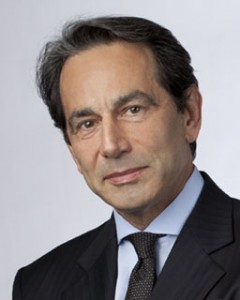“Brands Must Listen to Consumers More Intently”
At a time when traditional media is losing its sheen and digital is trying to dominate, market is undergoing a seismic shift.
While this transition is happening, marketers are enthused and confused, as changes in the digital marketplace are coming at the speed of thought.
At this juncture of market fluidity, RMN Digital invited Daniel Morel, chairman and CEO, Wunderman (a member of Young & Rubicam Group and WPP) to demystify some of the complex digital marketing issues for the benefit of all stakeholders including digital agencies, advertisers, marketers and even buyers.
Here he expresses his views in an exclusive interview with Rakesh Raman, managing editor of RMN Digital.
Qs & As
1. In the current business environment, what’s the need for companies to devise and deploy digital marketing strategies for their brands?
Consumers are in control, empowered by mobile and social technologies. The digital realm is where consumers exchange views in their conversations and communities. The digital value chain enables new, more efficient models disrupting almost every industry. Digital is both global and local. For digital marketers, global means local and national companies can market to consumers irrespective of location. Local means global brands can engage consumers and trigger action and sales at the point of purchase.
Today, brands can envision reaching six billion consumers. It’s a time of the most exciting (and challenging) transformation in business and marketing; and transformation is the new imperative for all. Established brands must learn to meet consumer standards and needs set by the best online brands, as well as creating new models essentially competing with their core. And for online brands to grow, they must extend their models to create value in the physical world of retail.
2. Are you satisfied with the pace of shift from the traditional ways of brand marketing to digital marketing?
Certainly not. Data tell us that brands are not where their consumers are and are behind consumers in using and participating in new channels and technologies. Brands must listen to consumers more intently, observe their behaviors and anticipate where they will be. It’s not, by the way, brand versus digital.
Many of the best brand marketers are the best digital marketers. Yet, many digital marketers are stuck in their website as destination past. Marketers who listen, track and optimize—locally and globally—will be the winners. All of us, brands and agencies alike, must invest more in training our people to equip them for this new world. That is probably the single greatest barrier to transformation.
3. What skills an agency should have to offer digital or interactive marketing solutions to its clients?
It starts with insight into behaviors and it ends with innovation for consumers and around their needs. There are new skills: the creative technologist; the social analyst; and the optimization expert. There are also new roles: consumer engagement; content developer and socializer; producers who manage onshore and offshore teams; global network managers who share insights and best practices, and transfer success globally.
These are new roles that must be designed and developed and they require new talent, which will increasingly come from anywhere in the world. It also requires training of both new and existing talent for this new way of working. Quite simply, agencies must rethink their processes as well as their skills for an always-on world.
4. How do you define content and what’s the role of content in the technology-driven always-on marketplace?
We define content as what engages consumers, and what consumers will share in their roles as critics, creators and champions of brands. So content can be brand and advertising creative, but it is much more. It is what happens to the creative idea in all channels and with all stakeholders in the brand’s ecosystem.
It is a company’s sustainability initiatives as well as its products and services. It is the voice of the consumer as well as of the brand. It is what consumers do with the content that may be started by the brand—how they evolve it and how they share it. Content is not what is created by the brand, it is everything in the ecosystem in which the brand competes.
5. How should clients measure the ROI on digital marketing?
I wish I had the exact answer to that one. This is not a science. And digital marketing does not exist on its own. But it is significantly more measurable than ‘general’ advertising. And its impact amplifies all other marketing and media, and in particular, advertising content.
So here is what is important. Tag and track everything—every asset, every campaign—across media. This enables you to optimize not just individual executions but the consumer’s path to purchase, and brand engagement.
On a macro level we work with our colleagues at Kantar to measure the best media mix allocation. On a micro level, we design messaging and targeting across consumer paths to purchase (online and offline) and optimization of investment across all media.
6. As there is a glut of digital agencies in the market, what’s Wunderman’s USP in the cluttered marketplace?
After all these good and difficult questions here is an easy one. Wunderman is unique. No agency network combines four attributes so powerfully. Yes we are digital, the leading agency in the world; please don’t think of our scale as heavy and expensive.
It means we always have the skills—mobile, social, local, etc.—and the resources to meet a client’s needs. Then we are still CRM, again at the top in the world, and that means we share accountability for our clients’ results through long-term consumer relationships—can you say digital agencies do that?
Then, we are data rich: we own data, we connect it with our partner and client data, and we develop unique insights because we can connect with consumer journeys, and the interests and passions they reveal through their online behaviors.
We are also truly global. Here’s where Wunderman stands alone. With more than 1,200 digital specialists in the BRICs (Brazil, Russia, India and China) and 800+ in the CIVETS (Colombia, Indonesia, Vietnam, Egypt, Turkey and South Africa), Wunderman not only has scale, we have tested processes, an integrated measurement framework, and technology platforms to rapidly and accurately deploy messaging—in any form—quickly to millions of consumers across hundreds of countries, in different languages, cultures and market segments.
7. What message do you have for emerging businesses that are looking for right marketing solutions?
Read Lester Wunderman’s book, Being Direct. Start with the customer and be obsessively customer-centric. Plan from the outset to treat the customer as an individual. Design marketing to track in real-time, instrument media to tag and optimize across channels. Add the new dimension of social and invest in, manage and be a vibrant part of the conversations and communities in your category.
Measure everything—not as an accountant, but as means of insight as to what’s working and why, and so as to optimize going forward. Think about the whole consumer—what are unmet needs of consumers not only for products but for services in which they can engage, and in causes in which they can participate.
* * *
Among his other roles, Daniel Morel (pictured above) is a member of the World Economic Forum’s Media, Entertainment & Information Industry Agenda Council 2010. He served as a member of the Direct Marketing Association’s Executive Board of Directors and Chair of its Marketing and Communications Standing Committee from 2004 to 2008. Also, Daniel is a past president of the Cannes Lions International Advertising Festival’s Cannes Lions Direct jury and was a member of its inaugural Titanium jury.
This interview is published under the RMN Digital’s “Thought Leaders” series in which top tech market leaders of the world express their views on different burning issues and market trends.














